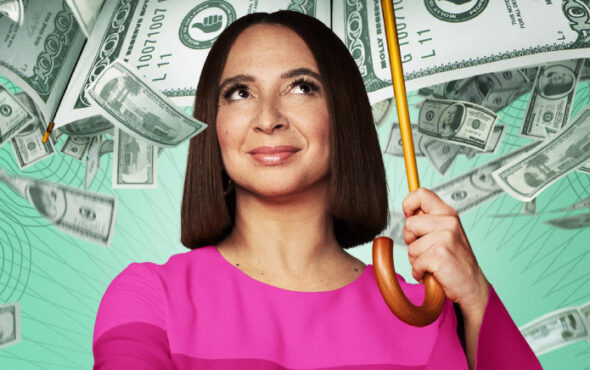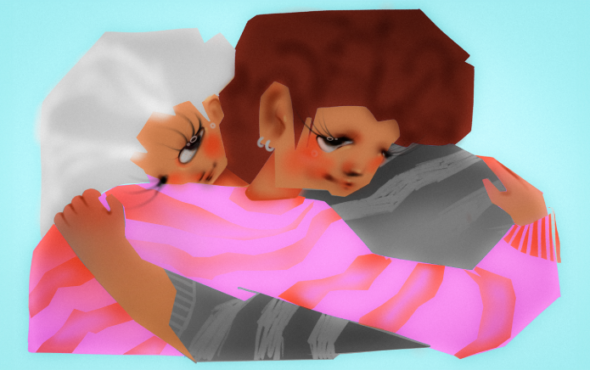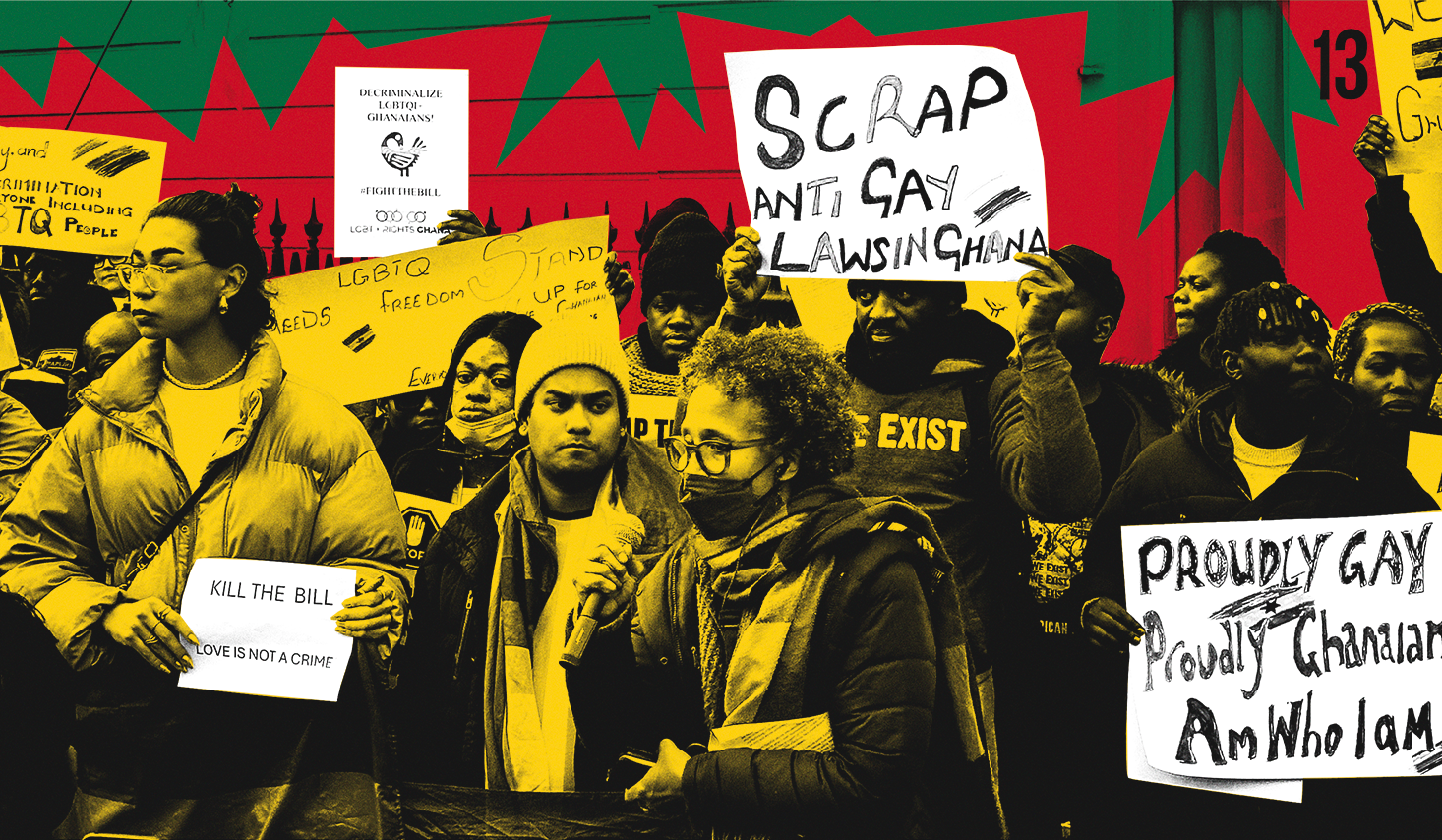
Lawmakers in Ghana last week passed a bill that, if signed into law by President Nana Akufo-Addo, would see simply identifying as LGBTQIA+ punishable by up to three years in prison. “It’s actually really a step backward for equality,” said Jesse Sperling, the Interim Executive Director of Kaleidoscope Trust, a charity fighting for the human rights of LGBTQIA+ people across the Commonwealth, which Ghana is a member of.
The legislation – officially titled The Proper Human Sexual Rights and Ghanaian Family Values bill – also imposes a five-year jail term for forming, funding or promoting LGBTQIA+ rights groups, something that comes amidst a wider crackdown on the community’s rights in the region. Lawmakers from both of Ghana’s leading political parties have backed the bill, with suggestions of replacing prison sentences with community service and/or counselling heckled down by MPs.
Gay sex is already illegal in Ghana and it’s well-documented that negative attitudes towards the LGBTQIA+ community are rife in the country. Anti-LGBTQIA+ content has also been steadily increasing there in recent years, according to a report published by reproductive justice organisation Ipas last year. Right wing outlets were found to be amplifying this type of negative rhetoric with “sensationalist and false reporting” that resulted in a “hostile” environment for LGBTQIA+ people both on and offline, the report further stated.
“What we’ve seen since [the bill] was proposed in the last few years already is a steady uptick in anti-LGBTI+ rhetoric and action in the country, a lot of what we would classify as hate speech coming from different sources like the government, the church and other religious institutions and in the media,” Sperling explained. “It really, really pushes people to the margins and so I think there’s actually a lot of fear about safety and access to services…We’re actually seeing a rise in anti-LGBT rhetoric and action across the globe.”
View this post on Instagram
MPs opting to pass the legislation last month has sparked global outrage within LGBTQIA+ communities and beyond. During a protest outside the Ghana High Commission in London on 6 March, more than 100 demonstrators urged President Akufo-Addo to “kill the bill” instead of signing it into law, which he is yet to do.
Alexander Adu Gyamfi, a Ghanaian activist who addressed the crowd, told GAY TIMES it was important for him to attend as an ally because he feels it’s “unacceptable” for any minority group to be “victimised” by lawmakers. “I have a number of friends back in Ghana and a lot of people who have contacted me who have been abused, beaten, are in hiding, [or] have been chased away from their houses,” he said. “Gay people cannot speak up in Ghana, a lot of people are scared.”
The proposed legislation comes not long after Uganda enacted one of the world’s most extreme anti-LGBTQIA+ laws last year, which includes the death penalty for ‘offences’ like transmitting HIV. Papa De, a queer Ugandan photographer and activist who was also at the protest, spoke of the importance of remembering that “the queer liberation was not and will never be an individual fight”.
“I am from Uganda, meaning that we have gone through the same thing that is happening in Ghana right now,” they continued. “Unfortunately, we were not able to stop that, we were not able to stop the President from signing that bill, and now it’s a law with implications that have been really, really grave when it comes to the queer community that is living in Uganda and also abroad…When they oppress us, they oppress everyone. We are not free until we are all free and freedom belongs to all of us, not just certain people.”
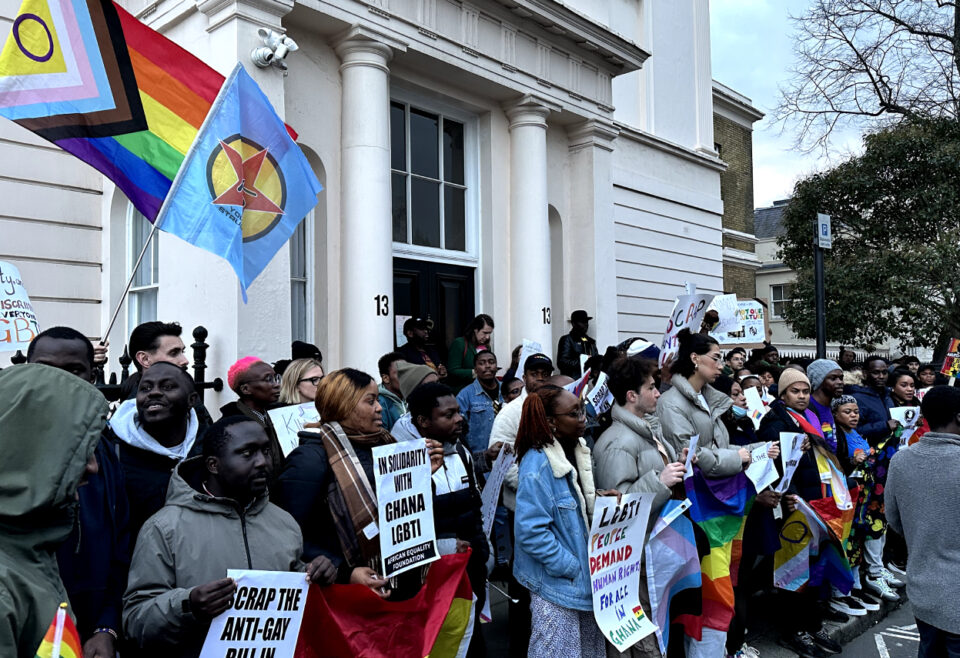
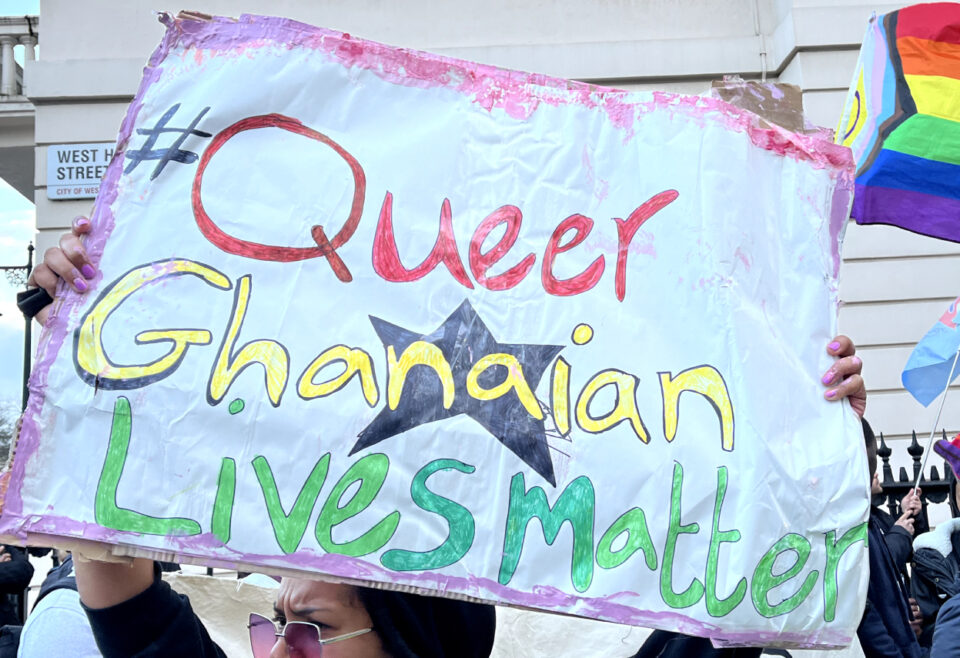
This sentiment was echoed by Bisi Alimi, a British-Nigerian LGBTQIA+ rights activist. “We have to come out and we have to protest against this madness that is sweeping across Africa,” he said. “We cannot continue to let them think that they can get away with this. This happened in Nigeria, we came out, we campaigned against it, we spoke against it, it happened in Uganda, and now it’s happening in Ghana. We don’t know where this madness is going and it’s important that they need to know that we are not going to sit down and let them take us for a ride.”
Peter Tatchell, a human rights activist who has played a pivotal role in the fight for LGBTQIA+ equality in the UK, added that “the struggle for queer human rights is universal, global and worldwide” and as such we must stand in “solidarity” with those affected by legislation targeting the community. “Clearly, the anti-LGBT+ bill violates Article 17 of Uganda’s own Constitution, which guarantees equal treatment and non-discrimination,” he stated. “It also violates similar clauses in the African Charter on Human and Peoples’ Rights and the Commonwealth Charter, which Ghana has signed and pledged to uphold.”
With the bill yet to be signed into law, all eyes are on President Akufo-Addo as LGBTQIA+ people wait with bated breath to see what he decides. The legislation is currently facing a challenge in the Supreme Court, which he has confirmed will help determine if he gives The Proper Human Sexual Rights and Ghanaian Family Values his assent. “We will do everything possible to ensure that the President doesn’t sign it, because if he does, we have to look at repealing the bill,” Gyamfi said. “We need to look at what we can do because things can be unconstitutional, 200 or so people cannot go and sit in a room and make a law which affects over 30-something million people. People don’t understand how dangerous this bill is.”


